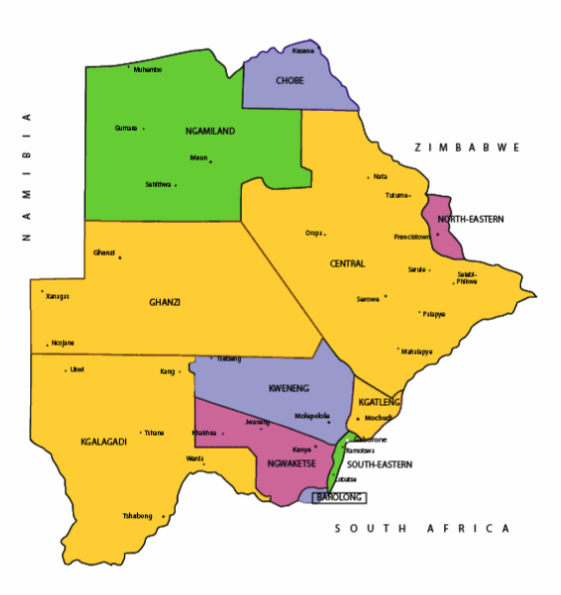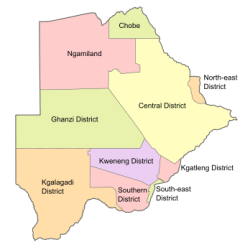Places and their polling stations in Thamaga-Kumakwane, Botswana
332 Losilakgokong-Kotolaname
1522 Kotolaname Primary School
1523 Monnaathebe Primary School
1524 Morabane VDC Huts
1525 Mapapeng Mobile Health Stop
1526 Ramagapu Mobile Health Stop
1527 Mosokotso Lands
1528 Ratshere Lands
333 Kubung
1529 Kubung Primary School
1530 Sepene VDC Huts
1531 Rammidi VDC Huts
1532 Mmampaba VDC Huts
334 Thamaga West
1533 Sekgele JSS
1534 Assemblies of God Church
1535 Thamaga Western Primary School
1536 Gamorepo Kgotla
1537 Goo-Motlhabane Kgotla Open Space (Tent)
335 Thamaga North
1538 Monare Primary School
1539 Thamaga Main Kgotla
1540 Tent at Holy Spirit Church
1541 Free Church
1542 Maradung Kgotla
336 Thamaga East
1543 Nkoane Primary School
1544 Magalatladi Primary School
1545 Thamaga JSS
1546 Kontle Primary School
337 Thamaga South
1547 Tent at Veterinary Office
1548 Rungwana Primary School
1549 Gobuamang Primary School
1550 Letlole JSS
1551 Go Sau (Open Space) Tent
338 Gakgatla-Ramaphatle
1552 Gakgatla Primary School
1553 Mmasebele VDC Huts
1554 Kamanakwe VDC Huts
1555 Diphepe Mobile Health Stop
1556 Ramaphatle Primary School
339 Kumakwane
1557 Kumakwane JSS
1558 Kumakwane Primary School
1559 Kumakwane Community Hall
1560 Paneng Lands
1561 Tshwaragano Brigade Horticultural Unit
Reference: iec.gov.bw/index.php/electoral-districts/polling-stations.html
Botswana
Botswana is a country in Africa. It is topographically flat, with approximately 70 percent of its territory being the Kalahari Desert.
It is bordered by South Africa to the south and southeast, Namibia to the west and north, and Zimbabwe to the northeast.
Capital: Gaborone
Currency: Botswanan Pula
Official language: English
Population: 2.588 million (2021) World Bank
Dialing code: +267
Gross Domestic Product: 17.61 billion USD (2021) World Bank
Botswana’s ten districts are:
- Southern District
- South-East District
- Kweneng District
- Kgatleng District
- Central District
- North-East District
- Ngamiland District
- Kgalagadi District
- Chobe District
- Ghanzi District
Botswana’s councils created from urban or town councils are: Gaborone City, Francistown, Lobatse Town, Selebi-Phikwe Town, Jwaneng Town, Orapa Town and Sowa Township.






The name Botswana refers to ‘Land of the Tswana’. The landlocked, Southern Africa country is officially known as the Republic of Botswana.














Botswana is connected to Zambia through the Kazungula Bridge making it the world’s shortest border between two countries.
A country of slightly over 2 million people (2021), Botswana is one of the most sparsely populated countries in the world. It is essentially the nation state of the Tswana ethnic group, who make up 79% of the population.

About 11.6 per cent of the population lives in the capital and largest city, Gaborone.
Formerly one of the world’s poorest countries—with a GDP per capita of about US$70 per year in the late 1960s—it has since transformed itself into an upper-middle-income country, with one of the world’s fastest-growing economies.


The Tswana ethnic group were descended mainly from Bantu-speaking tribes who migrated southward of Africa to modern Botswana, living in tribal enclaves as farmers and herders.




In 1885, the British colonised the area and declared a protectorate under the name of Bechuanaland.
As colonisation stopped, Bechuanaland became an independent republic under its current name on 30 September 1966.


Since then, it has been a representative republic, with a consistent record of uninterrupted democratic elections and the lowest perceived corruption ranking in Africa since at least 1998.

The economy is dominated by mining and tourism. Botswana has a GDP (purchasing power parity) per capita of about $18,113 as of 2021, one of the highest in subsaharan Africa.


Botswana is the world’s biggest diamond producing country.
Its relatively high gross national income per capita gives the country a high standard of living and the third-highest Human Development Index of continental Sub-Saharan Africa (after Gabon and South Africa).
The country has been adversely affected by the HIV/AIDS epidemic. In 2002, Botswana began offering anti-retroviral drugs (ARVs) to help combat the epidemic.
Botswana is a member of the Southern African Customs Union, the Southern African Development Community, the Commonwealth of Nations, and the United Nations.

